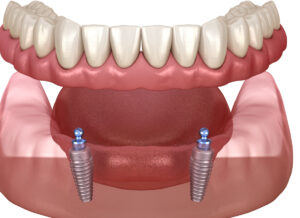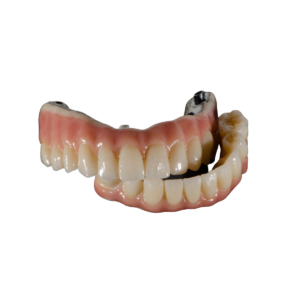 A Permanent Solution to Missing Teeth
A Permanent Solution to Missing Teeth
Traditional dentures have come a long way since their inception, but they can still cause problems like difficulty chewing and self-consciousness when smiling. Thanks to further advancements in dental technology, implant-supported dentures are now a popular alternative. At Northbridge Dental, our Alpharetta and Roswell implant dentists offer implant-supported dentures, a permanent and natural-looking solution for those with multiple missing teeth.
What are Implant-Supported Dentures?
Implant-supported dentures, also called fixed dentures are a type of denture supported by dental implants rather than the gum tissue. Dental implants are small titanium posts that are surgically placed into the jawbone where they fuse with the bone over time. This creates a stable foundation for the denture, which is attached to the implants with abutments.
The Types of Implant-Supported Dentures
There are three main types of implant-supported dentures: ball-retained, bar-retained, and screw-retained. Each type offers unique advantages and may be recommended based on your individual needs.
Ball-Retained Dentures
Also known as stud-attachment dentures, ball-retained dentures use a ball and socket mechanism to attach the denture to the implant. The ball is attached to the implant, while the socket is attached to the denture. This mechanism allows for some movement of the denture while still providing secure support.
Bar-Retained Dentures
Bar-retained dentures use a thin metal bar attached to the implants to support the denture. The denture clips onto the bar using special attachments, providing a secure fit. Your implant dentist may recommend this type of denture for those with a narrow jaw or limited bone density.
Screw-Retained Dentures
Screw-retained dentures are the most stable and permanent type of implant-supported denture. The denture is screwed directly onto the implant, providing a strong, secure fit. This type of denture is typically recommended for those with a strong jawbone and enough bone density to support the screws.
Your implant dentist can help you determine which type of fixed denture is best for you based on your individual needs and oral health.
 Benefits of Implant-Supported Dentures
Benefits of Implant-Supported Dentures
There are many benefits to choosing fixed dentures over traditional dentures. Some of the most significant advantages include:
- Improved Stability: Because the denture is supported by dental implants, it’s much more stable than a traditional denture, which can slip or shift in the mouth.
- Increased Comfort: Fixed dentures are more comfortable than traditional dentures, as they don’t put pressure on the gums.
- Better Chewing Function: With implant-supported dentures, you can chew and eat a wider variety of foods than you could with traditional dentures.
- Improved Speech: Traditional dentures can sometimes slip and cause speech difficulties, but implant-supported dentures stay in place, allowing for clear and confident speech.
- Natural-looking Appearance: Fixed dentures are designed to look and feel like natural teeth, giving you a confident and attractive smile.
- Affordability: Fixed dentures are often much more affordable than trying to replace most of the teeth in an arch or entire arches of teeth with singular implants.
Candidacy for Implant-Supported Dentures
You may be a candidate for implant-supported dentures if you:
- Have missing multiple teeth
- Have sufficient jawbone density to support dental implants
- Are in good overall health
- Are a non-smoker or willing to quit smoking before and after the procedure
- Are willing to commit to proper oral hygiene and regular dental check-ups
- Have realistic expectations for the procedure and its outcome
However, each case is unique, and the best way to determine if implant-supported dentures are right for you is to schedule a consultation with an implant dentist like those at Northbridge Dental. You can reach our Alpharetta office by dialing (678) 369-9609 or our Roswell office at (678) 352-9890.
 The Implant-Supported Dentures Process
The Implant-Supported Dentures Process
Initial Consultation
Before you get your implant-supported dentures, we’ll have you attend an initial consultation with one of our implant dentists. During this consultation, we’ll evaluate your oral health and determine if implant-supported dentures are the best option for you.
This consultation is a good time to ask any questions or voice any concerns you may have. If the prospect of implant placement scares you, or you’re in for a long appointment, talk to your implant dentist about sedation dentistry.
Implant Placement Surgery
If you’re a candidate for implant-supported dentures and decide to move forward, the next step is implant placement surgery. This involves inserting the dental implants into your jawbone. Before the surgery, we’ll apply a local anesthetic to numb you to any pain. Then, your dentist will make small incisions into your gums, and place the implants.
Osseointegration
After the implants are placed, you’ll need to wait several months for them to fuse with the bone in a process called osseointegration. This is an important step in ensuring the stability and longevity of your implant-supported dentures.
Abutment Placement
Once osseointegration is complete, the abutments can be attached to the implants. These are small metal posts that connect the implant to the denture.
Denture Placement
Finally, the denture can be secured in place. Your dentist will ensure it fits properly and comfortably. You may need to make several adjustments before the denture feels just right.
 Implant-Supported Dentures Maintenance
Implant-Supported Dentures Maintenance
Implant-supported dentures require regular maintenance and care to ensure their longevity and effectiveness. Here are some important aftercare tips to keep in mind:
- Maintain Good Oral Hygiene: Brush your teeth at least twice a day and floss regularly to prevent plaque buildup and gum disease. Use a soft-bristled toothbrush and non-abrasive toothpaste.
- Visit Your Dentist Regularly: Schedule regular checkups with your dentist to ensure that your fixed dentures are functioning properly and to identify any potential issues early on.
- Clean Your Dentures Regularly: Clean your dentures regularly using a soft-bristled brush and a mild, non-abrasive denture cleaner. Avoid using regular toothpaste, as it can scratch the surface of your dentures.
- Avoid Hard or Sticky Foods: To prevent damage to your implant-supported dentures, avoid eating hard or sticky foods like nuts, hard candy, and gum.
- Be Cautious with Hot Foods and Drinks: Fixed dentures can cause a delay in sensing hot temperatures, so it’s important to be cautious with hot foods and drinks to avoid burning your mouth.
- Be Mindful of Your Implants: If you have fixed dentures, it’s important to be mindful of the implants and to avoid putting too much pressure on them. This can cause them to become loose or even fail over time.
By following these aftercare tips and regularly visiting your dentist, you can ensure that your fixed dentures remain in good condition and continue to provide you with a functional, natural-looking smile.
